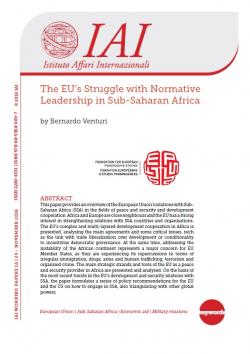The EU's Struggle with Normative Leadership in Sub-Saharan Africa
This paper provides an overview of the European Union’s relations with Sub-Saharan Africa (SSA) in the fields of peace and security and of development cooperation. Africa and Europe are close neighbours and the EU has a strong interest in strengthening relations with SSA countries and organisations. The EU’s complex and multi-layered development cooperation in Africa is presented analysing the main agreements and some critical issues, such as the link with trade liberalisation over development or conditionality to incentivise democratic governance. At the same time, addressing the instability of the African continent represents a major concern for EU Member States, as they are experiencing its repercussions in terms of irregular immigration, drugs, arms and human trafficking, terrorism and organised crime. The main strategic strands and tools of the EU as a peace and security provider in Africa are presented and analysed. On the basis of the most recent trends in the EU’s development and security relations with SSA, the paper formulates a series of policy recommendations for the EU and the US on how to engage in SSA, also triangulating with other global powers.
Paper produced in the framework of the project “The EU, the US and the International Strategic Dimension of Sub-Saharan Africa: Peace, Security and Development in the Horn of Africa”, November 2016. Publ. also in: Bernardo Venturi and Nicoletta Pirozzi (eds.), The EU, the US and the International Strategic Dimension of Sub-Saharan Africa: Peace, Security and Development in the Horn of Africa, Brussels, Foundation for European Progressive Studies (FEPS) and Rome, Istituto Affari Internazionali (IAI), 2016, p. 124-151, ISBN 978-88-6812-734-3
-
Details
Roma, IAI, November 2016, 20 p. -
Issue
16|29 -
ISBN/ISSN/DOI:
978-88-9368-009-7
1. EU engagement and relevance in the region
2. The role of the EU in peace and security issues in SSA
3. The role of the EU in development issues in SSA
4. The EU’s interaction with other international actors in SSA
4.1 The EU’s interaction with other international actors on peace and security
4.2 The EU’s interaction with other international actors on development cooperation
Conclusion: A comprehensive Africa policy for the EU
References



